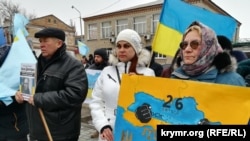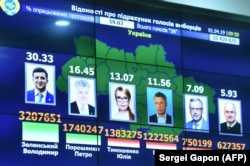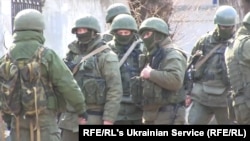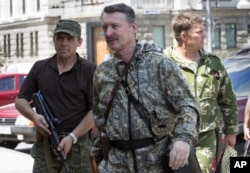Following the first round of Ukraine’s presidential election on Sunday, March 31, which he led by a wide margin, Volodymyr Zelensiky was asked at a press conference if a date for his first meeting with Russian President Vladimir Putin had been set.
Despite winning by a side margin, Zelenskiy still must face President Petro Poroshenko in the second round later in April. Still, Zelenskiy replied:
“If I meet with Putin, I will tell him: ‘Well, finally you have returned our territories. How much more money are you ready to repay for the territories that you took away, for helping people who participated in the escalation in Crimea and Donbas and helping on all of their terrible, cruel and disgusting way?’”
When asked about Zelenskiy’s comments on Monday, Russian presidential spokesman Dmitry Peskov said the basis of any such talks would be a non-starter.
“We are ready to explain to any Ukrainian citizen that Russia is not occupying any Ukrainian territories and generally there can be no talk about that," the Kremlin spokesman said.
Peskov, who said the ‘Donbass republics’ "have been torn away by Ukraine itself," was more adamant when it came to the Crimean peninsula.
"Moreover, the word ‘occupation’ or ‘annexation’ is absolutely not applicable to Crimea either de facto or de jure. All that happened in Crimea was done in strict accordance with the Ukrainian legislation and on the basis of international law," Peskov stressed.
Both statements are false.
As previously reported by Polygraph.info, as well as many other new agencies, the Russian takeover of Crimea in February 2014 began when Russian special forces, operating without national insignia, seized the Crimea parliament building and raised the Russian flag. The bloodless invasion by the so-called “little green men” resulted in unmarked Russian soldiers taking control of the Republic.
Russia’s ex-military intelligence officer Igor “Strelkov” Girkin, a leading “self-defense” commander in Crimea and later commander of separatist forces in eastern Ukraine, admitted in a 2015 interview that members of the Crimean parliament were herded into a chamber at gunpoint and forced to support the annexation.
The referendum, hastily carried out under military occupation, did not allow for public debate or for political leaders from greater Ukraine to visit the Crimean peninsula. And, in accordance with Ukraine’s constitution, all Ukraine’s citizens should have been given a vote on Crimea’s succession, not only residents of the peninsula.
As a result, on March 27, 2014, the United Nations General Assembly adopted Resolution 68/262, stating that the referendum, “having no validity, cannot form the basis for any alteration of the status of the Autonomous Republic of Crimea or of the city of Sevastopol.” The resolution urged all countries “not to recognize any alteration of the status” of Crimea.
Notably, prior to Russia’s annexation of Crimea, Putin himself had publicly recognized the peninsula as Ukrainian territory, calling any talks of Russia potentially targeting Crimea a “provocation.”
Following the de facto Russian takeover of South Ossetia and Abkhazia in the wake of the 2008 Russo-Georgian War, the German broadcaster ARD asked Putin if Crimea was the next “target” for Russian aggression.
Putin replied:
“The Crimea is not a disputed territory. There is no ethnic conflict there in contrast to the conflict between South Ossetia and Georgia,” he said, adding:
“Russia recognized the current borders of today’s Ukraine a long time ago … The question of ‘targets’ for Russia only serve as provocation.”
As for the Donbass republics having been torn away by Ukraine itself, Strelkov, speaking with Zavtra newspaper in November 2014, said that he “was the one who pulled the trigger of this war.”
"If our unit hadn't crossed the border, everything would have fizzled out — like in [the Ukrainian city of] Kharkiv,” he said.
"There would have been several dozen killed, burned, detained. And that would have been the end of it. But the flywheel of the war, which is continuing to this day, was spun by our unit. We mixed up all the cards on the table," he said, referring to the Russian paramilitary forces under his command.
And as Polygraph.info previously reported, in spite of numerous denials, the evidence of Moscow’s involvement in the Donbas war is overwhelming and has been confirmed by numerous open-source investigations, journalistic investigations from international and Russian media outlets, and even Russian officials at times.
Specific “smoking gun” evidence includes:
- The presence of Russian military equipment in Eastern Ukraine neither produced by, nor purchased by the Ukrainian armed forces, such as the T-90A main battle tanks;
- The “separatists’" continued access to large quantities of advanced military technology and the ammunition, fuel, and spare parts to operate them;
- A Vice report which proved the presence of Russian serviceman of the 37th Motorized Infantry Brigade (Kyakhta) operating in Eastern Ukraine (and likely prompted Russia’s “anti-selfie soldier law");
- And, a wealth of open source intelligence (OSINT) produced by groups such as Bellingcat and Inform Napalm demonstrating Russian military movements in Ukraine.
- On May 24, 2018, the Dutch Joint Investigative Team (JIT) presented its findings on the system that shot down the passenger airliner MH17, which was flying over eastern Ukraine en route from Amsterdam to Kuala Lumpur. The JIT determined the missile system had been provided from Russia and identified the military unit it belonged to – the Russian armed forces’ 53rd anti-aircraft missile brigade.
Based on the evidence available, the International Criminal Court in November of 2016 determined that the war in Ukraine was a Russian invasion and not, as Russia claimed, a civil war. In response, Russia withdrew from the ICC.
Polygraph.info therefore finds that Peskov’s statements regarding both Russia’s annexation of Crimea and the nature of the conflict in the Donbas to be false.








